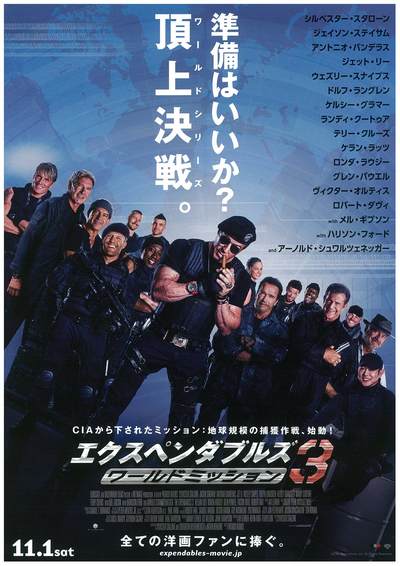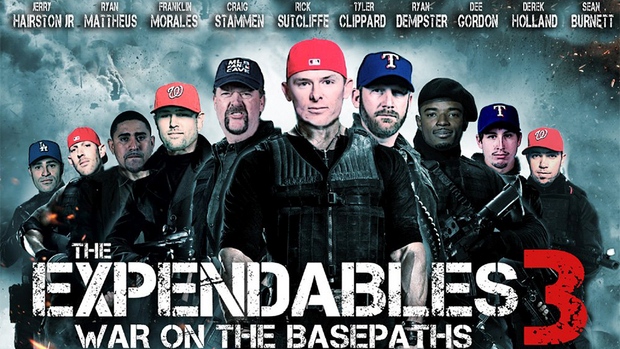Expendables 3: World Series
« previous post | next post »
There are some intriguing features about this Japanese poster for Expendables 3:
Notice that the furigana ruby for 頂上決戦 (chōjō kessen ちょうじょうけっせん [“summit showdown”]) is ワールドシリーズ (wārudo shirīzu ["World Series”]). One wonders what they mean by that in the context of this film.
In English language publicity for the film, I'm not aware of wording similar to junbi wa ī ka 準備はいいか? ("Are you ready?") or chōjō kessen 頂上決戦 ("summit showdown”). Furthermore, so far as I know, wārudo shirīzu ワールドシリーズ ("World Series”) isn't used in Japanese to refer to anything other than the major league baseball championship.
Lest you be led to believe from its prominent position on the poster that wārudo shirīzu ワールドシリーズ ("World Series”) is the Japanese title of the film, note that the actual title of the film is given in katakana just beneath the dramatic sloping line of heroes, followed by wārudo misshon ワールドミッション ("world mission"), which is the subtitle for Expendables 3. Perhaps the "world" here stimulated the copywriters to come up with the "World Series" furigana annotation for chōjō kessen 頂上決戦 ("summit showdown”). After all, this is the final battle, the battle to end all battles, isn't it?
In a quick scan of the Google images for Expendables 3, I came across this curious takeoff:
Somebody else was thinking along the same lines as the Japanese copywriters.
Junbi wa ī ka 準備はいいか? ("Are you ready?") and chōjō kessen 頂上決戦 ("summit showdown”) are advertising slogans (kyatchikopī キャッチコピー ["catch-copy"] in Japanese) for this movie. On Japanese movie posters, there are often phrases or words that represent a movie. Such kyatchikopī キャッチコピー ("catch-copy") is added even when the original posters for foreign films are made without them. Sometimes these phrases and words function as crucial features of successful advertisements for indigenous Japaese productions. One of the major examples is a series of slogans made by Itoi Shigesato 糸井重里 for animations of the Studio Ghibli (Miyazaki Hayao's studio).
[Hat tip Chris Pickel; thanks to Miki Morita and Hiroko Sherry]


Janne said,
January 13, 2015 @ 11:52 pm
I've seen the same thing in novels at times: the furigana would not represent the pronunciation of the word, but be a different word with similar meaning to the main one. Looks to me the author is (mis)using furigana to add nuance without belabouring the sentence further. The closest I can come up with is when people use a slash to combine two words into one concept.
AG said,
January 16, 2015 @ 11:00 pm
To over-explain the obvious, the metaphorical conceit here is that normal action movies are analogous to regular-season baseball games, while The Expendables is, like the World Series, an ultimate / decisive battle which features an elite roster (in this case, a bunch of action movie stars are crammed into a single movie).
I've seen this a lot, where Japanese writers use furigana not as a direct phonetic description of the kanji it's next to, but as a kind of wildly free-form subtitle or footnote space.
The starting point for this practice seems to have been the use of furigana to add a "Japlish" or loan-word second meaning to a term — For example, in the late-80s/early90s comic "Master Keaton" I'm currently reading, someone refers to a German "blood and iron party" (血と鉄党), and next to it is a rather painful katakana rendering of "BLUT UND STAHL".
So from this starting-point, I think things have evolved to where the current situation is that writers feel free to use furigana to add any kind of related terms or linguistic touches in foreign languages, or just plain additional shades of meaning completely divorced from phonetics, like in the poster above.
For example, A few pages later in the same comic, someone points to the Lloyd's insurance building, and next to "Lloyd's" in katakana in the main text (ロイズ) is furigana "あそこ", or "over there".
In this case, I can only conclude that the furigana is just an unusual way to emphatically parallel in the text what's happening in the comic panel, which is that the speaker is pointing with his thumb out the window at the building in question. I don't really know which text we're supposed to assume the speaker actually says – is he meant to be audibly saying "Lloyd's" or "asoko"?